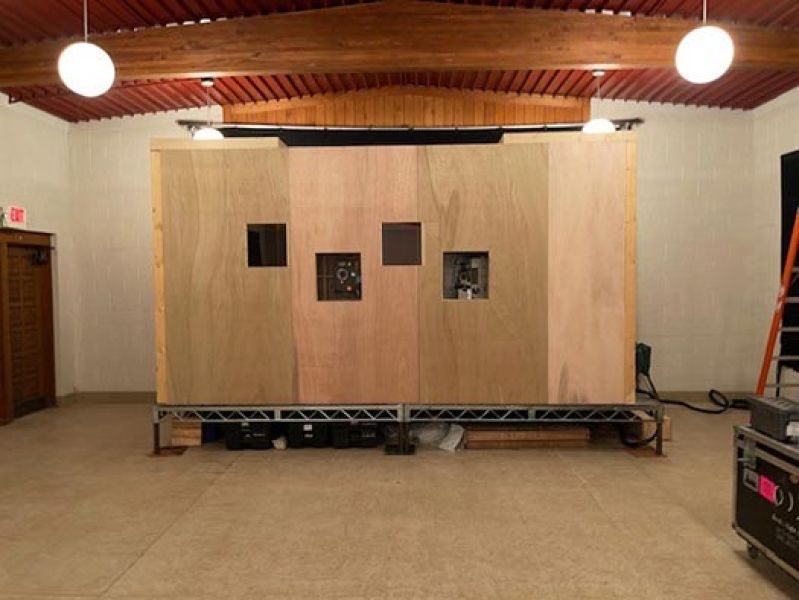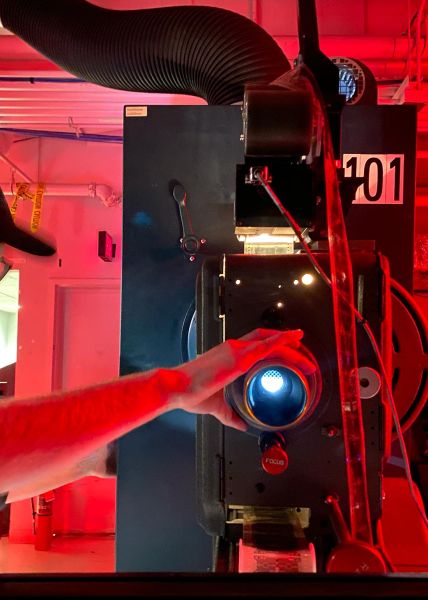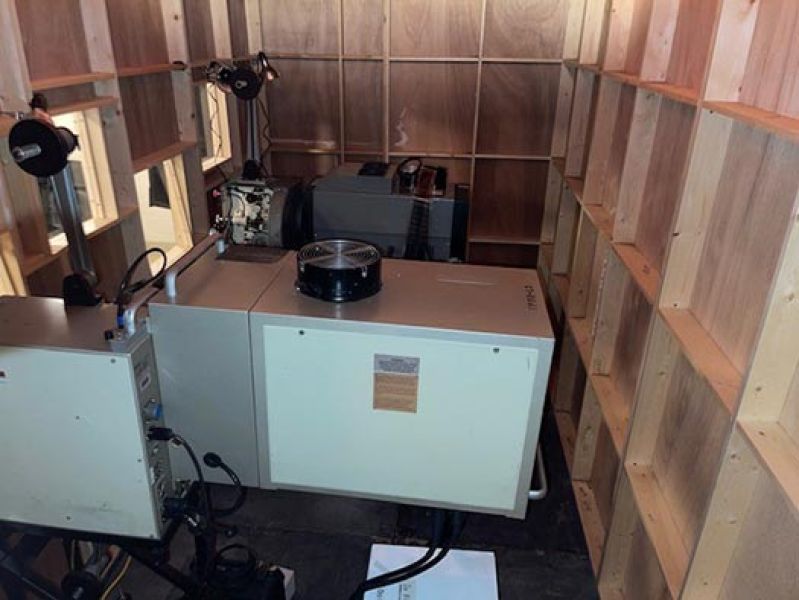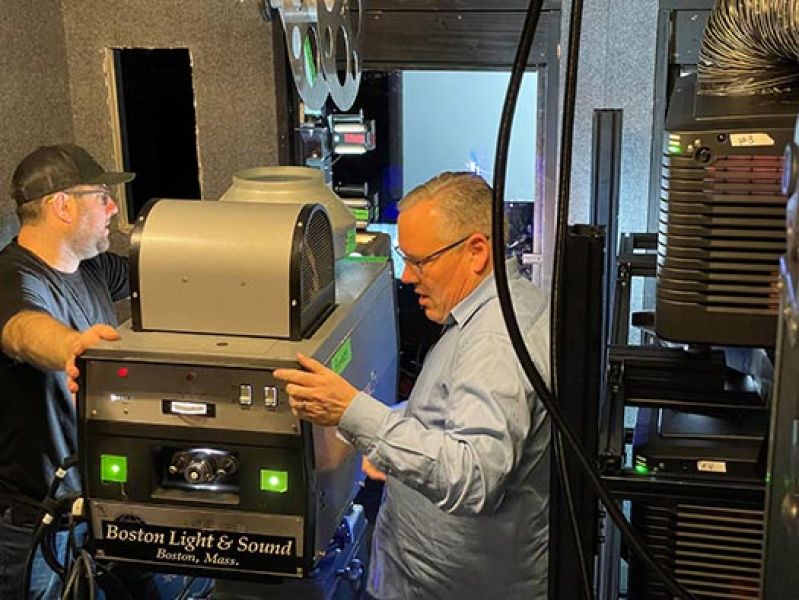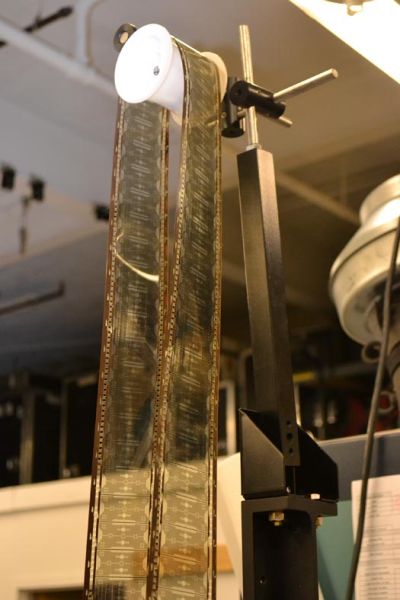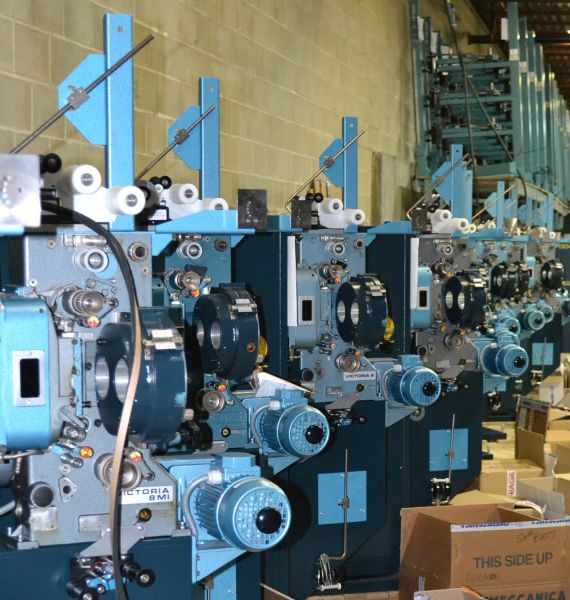Project Gallery
The Art of 70mm Film Projection & Special Event Presentations
Go behind the scenes of our landmark 70mm film projects—where precision, collaboration, and a love of cinema come together on screen.
Oppenheimer 70mm Release

Summary
Universal Studios Taps Boston Light & Sound for Landmark 70mm Rollout Across North America
When Universal Studios set out to bring Christopher Nolan’s Oppenheimer to 70mm screens across the country, they turned to Boston Light & Sound—a longtime collaborator with experience on similar projects, including Dunkirk and The Hateful Eight. With deep technical knowledge and a history of delivering complex, large-format cinema projection for premieres, BL&S was uniquely positioned to support this high-profile release.
Supporting the Production Process
The work began during production, with BL&S designing a custom dailies system to help the director and cinematographer review footage on location—often in remote environments. The film was shot directly onto 65mm stock, so the team engineered a custom dual-projector setup that enabled both 70mm and 35mm playback of dailies transferred from IMAX film for quick and accurate reviews on set.
Post-Production Projection System Integration
During post-production, the filmmakers needed to screen the 70mm print on a large-format screen. BL&S installed a custom-configured 70mm Kinoton electronic studio projector at a Hollywood multiplex, integrating it with a ProTools sound station to enable synchronized audio playback. The system was designed to work seamlessly with the theater’s existing Dolby Digital setup while maintaining full flexibility for standard digital cinema content.
Nationwide Rollout and Logistics
As the release approached, BL&S commissioned and distributed the specialized equipment required to project the film across 71 locations nationwide. Originally planned as a two-week theatrical run, the film’s success extended that timeline to 13 weeks—making staffing a significant challenge. BL&S coordinated the deployment of trained projectionists to every site, ensuring consistent, high-quality film presentation throughout the extended engagement.
Advanced Audio Integration and Custom Solutions
Additional responsibilities included supplying specialty lenses, refurbishing DTS systems, and developing a custom solution to interface DTS playback with modern Dolby Atmos setups. This included reverse engineering and fabricating a custom circuit board that allowed for seamless switching between digital projection and DTS audio from film reels—without compromising Atmos compatibility.
Print Assembly and Ongoing Support
BL&S also supported reel assembly and print make-up, preparing large-format prints from Fotokem for the exhibition. Throughout the run, the team provided 24/7 technical support to keep everything operating smoothly.
A Celebrated Cinematic Experience
Thanks to a collaborative approach and careful attention to detail, the rollout exceeded expectations and was celebrated by both the studio and audiences nationwide.
Explore Our Sophisticated Solutions
The Hateful Eight

Summary
Boston Light & Sound® Brings Tarantino’s New Western to Theatres in Glorious Ultra Panavision 70mm
When producer Shannon Macintosh approached Boston Light & Sound® (BL&S) to support dailies for The Hateful Eight, the request quickly evolved into something far greater: preparing 70mm film projection systems for 100+ theaters across North America—a scale not seen in decades.
A Reason to Return to the Theatre
Director Quentin Tarantino chose to shoot the film in Ultra Panavision 70, a wide-format process last used in the 1960s. To bring this artistic vision to audiences, BL&S was tasked with locating and restoring more than 120 projection systems—many of which had been out of production for over 15 years. The project required custom-built parts, anamorphic lenses, and system modifications to handle the film’s ultra-wide format.
A Movie Release on a Grand Scale
BL&S drew on decades of experience to design, remanufacture, or adapt more than 125 individual components—including gears, platters, and timecode readers. The team also sourced DTS systems, created water chillers, and built new transport cases to accommodate 3-hour film prints.
Preparing the Stage
The installation brought its own challenges. Many theaters needed power upgrades, new exhaust systems, or architectural changes just to accommodate the equipment. BL&S coordinated electricians, contractors, and venue staff to make it happen, sometimes with just days to spare. In the final stretch, they recruited and trained projectionists, developed custom documentation, and deployed 18 support technicians across the country.
Solving Movie Distribution Challenges
To manage film distribution, BL&S opened a facility in Valencia, CA, to assemble 20-reel prints into seamless platters, eliminating the need for mid-show reel changes. We also provided 24/7 technical support throughout the project.
Celebrating a Successful Show!
By Christmas Eve, The Hateful Eight was presented in stunning 70mm in over 100 theaters, earning praise from audiences, filmmakers, and projectionists alike. For co-founder Chapin Cutler, it was a full-circle moment, returning to a craft he first embraced decades earlier.
“This project is a culmination of my 50-year career, bringing it together into one massive project,” Cutler said. “We’ve come full circle. My first job was at a movie theatre in 1964 where I ran My Fair Lady as a 70mm roadshow engagement. The Hateful Eight has allowed us to go back and in some ways reinvent the craft that we were trained into early in our careers. We are very proud and blessed for this experience and the hundreds of people who supported us in this endeavor.”
